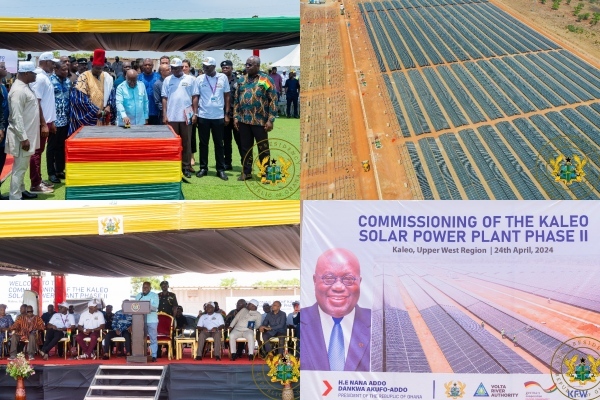Akufo-Addo commissions 15MWP Kaleo Solar Power Plant
“The vision, however, is not only to be energy self-sufficient, but also to set the stage for Ghana to emerge as an eco-friendly country in the Region, inspiring neighbouring countries to follow suit in their pursuit of a greener, more energy-technology-centred future,” he added.
- Advertisement -
President Nana Addo Dankwa Akufo-Addo, on Wednesday, 24th April 2024, in a momentous ceremony held in Kaleo, officially inaugurated phase two of the Kaleo Solar Power Plant, marking another significant stride in Ghana’s renewable energy journey.
With a capacity of fifteen megawatts peak (15MWp), this addition underscores Ghana’s commitment to harnessing clean energy sources and building a sustainable future for generations to come.
Addressing a gathering of dignitaries, chiefs, and community members, President Akufo-Addo emphasized the importance of renewable energy in driving economic growth, mitigating climate change, and ensuring energy security for all citizens.
He praised the collective efforts of stakeholders, including the Chiefs and people of the Nadowli-Kaleo traditional area, the German Government, the Volta River Authority (VRA), and project contractors, for their invaluable contributions to the successful completion of the project.
The President highlighted the strategic significance of Kaleo as a hub for renewable energy development, citing its rich natural resources and potential to attract investment and spur innovation in the region.
He reiterated Government’s commitment to incentivizing green investments, promoting energy efficiency, and prioritizing the development of solar, wind, and hydroelectric power projects as key strategies for the nation’s energy sector growth.
Phase two of the Kaleo Solar Power Plant not only adds fifteen megawatts of clean energy to the national grid but also improves the quality of power supply in the Upper West Region. Furthermore, it is estimated to reduce national carbon emissions by nearly 8,917 tonnes, contributing to Ghana’s efforts to combat climate change and fulfill its international commitments. It will also promote practical studies in the development of solar power by the Technical Universities in the northern part of the country.
President Akufo-Addo reiterated Government’s commitment to invest continuously in the electricity transmission network, to enable the country to evacuate more renewable energy through the national grid to support the extension of electricity to all parts of the country.
“It is our intention to attain full electricity access by the end of this year, up from the current rate of eighty-eight-point-eight percent (88.8%),” he stated.
The President continued, “I expect that, with this project in this community, corporate social responsibility programmes for Kaleo and its environment will be enhanced through the provision of social amenities by the appropriate authorities, including VRA.”
President Akufo-Addo expressed optimism about Ghana’s energy future, emphasizing the importance of collaboration and collective action in achieving sustainable development goals. He urged all stakeholders to uphold effective maintenance management practices to ensure the longevity and efficiency of renewable energy infrastructure, reaffirming his government’s dedication to building a brighter, greener future for all Ghanaians.
“By investing in renewable energy infrastructure, we are securing a reliable source of electricity and creating new opportunities for economic growth and job creation. This plant will not only power homes and businesses, but also serve as a catalyst for development in the Upper West Region, attracting investment and spurring innovation,” he added.
The President told the gathering that Government is implementing a series of policies and measures to incentivise green investments, foster a culture of energy efficiency, and prioritise the development of solar, wind, and hydroelectric power projects as key strategies for the growth of the energy sector in the country.
“The vision, however, is not only to be energy self-sufficient, but also to set the stage for Ghana to emerge as an eco-friendly country in the Region, inspiring neighbouring countries to follow suit in their pursuit of a greener, more energy-technology-centred future,” he added.
- Advertisement -
- Advertisement -


